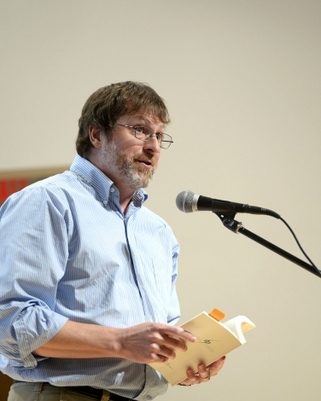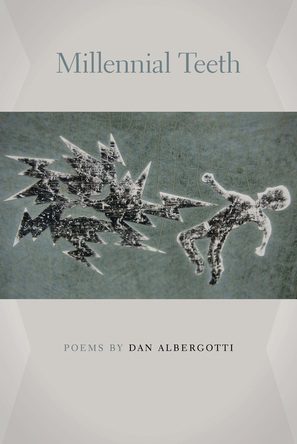Matthew Thorburn, Poet - Author of Dear Almost
Menu
“I was trying to come to terms with the insufficiency of words”: An Interview with Dan Albergotti5/19/2015  Recently I had the opportunity to interview poet Dan Albergotti for the Ploughshares blog. As is often the case with these interviews, I admire and am interested in and want to talk about this writer’s work so much that I had more questions that space permitted, so here’s part 2 of our conversation… MT: Could you also talk more generally about how a poem starts for you? And on the flip side, would you talk more specifically about “Inside” and “Aphelion & Aphasia”? How did each of these poems start, and what was the writing and revising process like? DA: I wish I could respond to this intelligently, but really, I’m pretty baffled about where my poems come from. All I know is that I am obsessive about lines and phrases (and even just sounds). I’ll find a few words dancing around in my head, often when going to bed or waking up and sometimes during repetitive, routine activities like walking and showering, and I’ll keep returning to them, willfully or not, until I write them down somewhere. That’s where the ideas for poems most often start anyway. Then I play with those lines and phrases until I’ve found the right vehicle for them. With “Inside,” I had been thinking about the fact that we have no forms in English in which a predictable pattern of duple and triple feet occurs within a line. It’s always either a duple-foot line with a rare triple-foot substitution or vice versa. So I thought “why not?” and tried to imagine the sound of a line that would have regular interplay of the two types of poetic foot. I literally started hearing just the sounds of this line: anapest / iamb / iamb / anapest / iamb. When I started hearing that rhythm, I found the poems “Inside” and “Outside.”  “Aphelion & Aphasia” was a much different process where the content had a more primary role. I began writing it at the Virginia Center for the Creative Arts in July of 2012, a few weeks after a super derecho rolled through the area, ripping up trees and causing widespread damage and power outage. At the same time, I was trying to come to terms with my mother’s death, my estrangement from my family, and the insufficiency of words. I guess this poem would be categorized as “meditative,” and there’s certain a discursive, free-verse feel to it. But it’s also pretty strictly decasyllabic. In recent years, I’ve found that I almost can’t write poetry without applying at least a syllabic regimen. I hope some of this answer has made a shred of sense; whenever I talk about my own writing process, I feel like it’s just a bunch of babble. MT: Millennial Teeth is a very cohesive book thanks to the sonnets and ghazals we’ve discussed, which appear throughout the book, but also thanks to paired poems like “Neither” and “Nor,” which bookend the collection,” and “Inside” and “Outside,” which do something similar in the book’s third section. Thematic lines run through the poems too – faith and loss of faith, family strife – to create connections between poems. Could you talk about the process of putting the book manuscript together? Did you have an idea in mind of how it would look from the start, or at some point as you were writing, or did that come later? DA: I usually don’t think about a book’s structure when writing individual poems. I just write to my obsessions and assemble the manuscript later. With that said, though, I certainly write small groups of poems that are related, and that makes it easier to put together a book that can make clear those “thematic lines” you mention. Placing individual poems of such small groups throughout the manuscript makes it easier for me to see how other poems might be talking to each other too. If I were to have put “Neither” and “Nor” together in the manuscript (or “Inside” and “Outside,” or the 9/11 ghazals), I don’t think the book would make nearly as much sense. Now I’m not sure I could articulate why that is the case…. MT: On a related note, I’m a big fan of the Crab Orchard Series in Poetry. What was your experience like working with the series editor and with Southern Illinois University Press? DA: Heaven. Seriously, working with series editor Jon Tribble and the amazing people at Southern Illinois University Press has been a complete delight. Like you, I had been a big fan of the series before my book was chosen, so I was thrilled when I learned I’d won the open competition and had very high expectations of what the experience would be like. But it has exceeded all of them. The editors, the design and production team, the marketing department—they’re just all fantastic. MT: What are you working on now? What’s next for you? DA: I’m still writing Albergonnets and playing with form (including others in another sonnet variation that you can see in “For Forgetting” and “Some Other Day” in Millennial Teeth), as well as writing more discursive, exploratory poems in the style of “Aphelion & Aphasia” and “Splinter & Sneeze.” Still writing to the same thematic obsessions and probably always will be. Natasha Trethewey always says that a poet should “honor his or her obsessions” rather than self-consciously trying to tamp them down. I trust her on that one. I have no idea when the poems I’m writing now will be brought together in another manuscript; I just hope to have good judgment in determining when they should be.
0 Comments
Leave a Reply. |
 RSS Feed
RSS Feed
